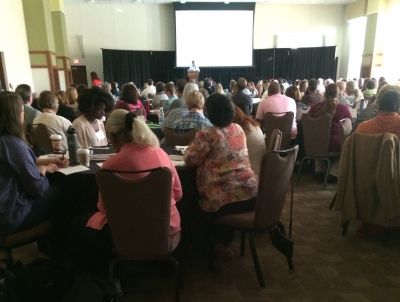Local Food Summit Inspires Michiana Attendees

A small contingent of folks from the Elkhart County region attended a statewide local food event in Indianapolis in early October. The Indiana Local Food Summit was organized by Purdue University and held at the Ivy Tech Culinary School in Indianapolis. It drew individuals from throughout the state, ranging from farmers and local food educators to food council representatives and school district food managers. The input and networking sparked new ideas and provided helpful suggestions for the food sheds of northern Indiana.
Why was this event organized? Indiana communities could benefit in many ways if more Hoosier food dollars were spent on food raised in Indiana. At present, only a tiny fraction of our food budgets are spent on Indiana-raised foods.
New contacts
Attending the event was encouraging. I was grateful to represent Goshen College, talk to other attendees about our involvement in the Elkhart County Foodshed Initiative project, and to share about sustainable agriculture programs offered through Merry Lea. A friend and collaborator, Phyllis Miller—chair of Maple City Market and local food/health advocate—also attended. I encountered the familiar faces of friends, farmers, and practitioners we’ve seen at other meet-ups, but perhaps more significant were the conversations with strangers. We both made new contacts from different parts of Indiana who are working to improve communication about the value of local food production, procurement, and policy.
One of these was a graduate student in a PhD program in economics. This gentleman had recently become engrossed in food policy and activism to the point that his degree program may be not as helpful as he once thought. I know others in their 20s and 30s who similarly have found themselves well down a career path, only to discover how compelling food issues can be, causing them to shift course in significant ways.
This student of economics reminded me that understanding the economic side of a food system is just as important as knowledge of natural science. A person may spend years trying to understand plant development, soil chemistry, and animal science, but it doesn’t make sense to raise crops and animals without some understanding of evolving market trends, home economics, and relevant trade policies.
Addressing Local Food Policy
Phyllis and I both attended a breakout session for folks wanting to learn about how to form food councils and address local food policy. In our session, each person shared about the food issues they are trying to address in their own communities. We told about the Elkhart County Foodshed Initiative and the recent study of our foodshed. Leaders from the Bloomington Food Policy Council shared some of their challenges and successes with starting a council in a transient college town. They developed a food charter, which they presented to the Bloomington City Council, which later approved it. Phyllis and I left that conversation wondering if our region would also want to develop a food charter. If so, to whom would we present it in our part of Northern Indiana? City councils? County government?
One of the more frank conversations around our table was about racial and socio-economic divides that can affect food policy and food councils. An African-American woman growing food in Indianapolis shared her frustration with feeling ignored. This local food advocate for an urban neighborhood felt that food councils included mostly representatives from powerful companies, organizations, and institutions. Ordinary folks weren’t able to join. In her experience, universities wanted to come in and tell folks what to grow and how to grow it. We talked about approaches to food initiatives that are truly inclusive and ways that we may divide ourselves. Sometimes this happens unintentionally or out of ignorance.
Power Dynamics and Food
What I remember from that honest, somewhat awkward conversation is that everyone has a food culture, a food history, and a food reality. Sometimes these food realities are messy and broken. After all, food is both personal and political. Power dynamics certainly affect food issues: some neighborhoods are lucky to have access to high-quality food while others may not have a grocery store even within a ten-minute commute.
I continue to stew on some of the tough food issues that face people in our regions. Many of us probably don’t think about why grocery stores locate where they do, but the repercussions have real impact on people’s lives. Elkhart County has five designated ‘food deserts,’ according to one USDA metric. What is it like to shop for food if you are mobility challenged? How does a person buy groceries if she or he doesn’t own a car, cannot obtain a license, or lives in an area with no public transportation? What should a person do if a dirty river floods their backyard soil or their yard is downwind from chemical spraying? What if it is too risky to raise a garden?
I returned after the conference with assurance that there is urgent and useful work to be done in Northern Indiana foodsheds. Goshen College is at the table, ready to be part of the developments surrounding food issues in the Michiana region. I know that Goshen College and its Merry Lea Environmental Learning Center offer ways for people of all ages to experience a landscape that produces food and where natural systems are valued. Goshen College is also committed to equipping students to think critically about food issues–even those that are complex, interdisciplinary, and intercultural. I hope we can help reconcile injustices and provide hopeful, productive solutions to food challenges. I look forward to what may unfold next.
by Jon Zirkle, Director of Agroecology, Merry Lea




